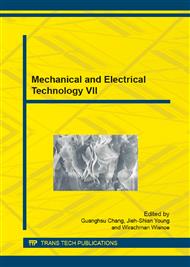p.217
p.222
p.232
p.237
p.247
p.251
p.256
p.261
p.266
Investigation of Chip Formation and Tool Wear in Drilling Process Using Various Types of Vegetable-Oil Based Lubricants
Abstract:
Cutting fluid is a well-known as one of an important element in machining process. However, the consumption of mineral oils as cutting fluid has been raising concern due to worldwide interest in environmental and health matters. The application of vegetable-oil based lubricant is seen can overcome the problem but requires a research study about the machinability. This research paper represents the machinability of using several possible vegetable oils as cutting fluid in term of chip formation and tool wear during drilling operation on stainless steel, AISI 316. In particular, the performance of the vegetable oils; palm, sesame, olive and coconut oils were compared under minimum quantity lubrication (MQL) technique. The result reported that the coconut oil indicates the best machinability in term of highest and uniform chip thickness and least wear on the drill bit under same condition with others. These performances are followed by palm, olive and sesame oil. In additional, the viscosity measurement indicates that coconut oil has the lowest value which can possesses better fluidity and faster cooling capacity than other oils. Overall, coconut oil is recommended as viable alternative lubricants during drilling of stainless steel.
Info:
Periodical:
Pages:
247-250
Citation:
Online since:
October 2015
Authors:
Keywords:
Price:
Сopyright:
© 2015 Trans Tech Publications Ltd. All Rights Reserved
Share:
Citation:


